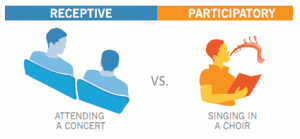How has the relationship between the orchestra and its community changed over the past century? (more…)
Posts Tagged ‘neil harris’
-
Video: The Changing Landscape
Topic: Audience, Community, Creativity | Tags: alan gilbert, ed sanders, jesse rosen, margo drakos, mason bates, matthew vanbesien, neil harris, video
October 16, 2012 by Beth Hondl | Comments (0)
-
New! Podcast – Chapter One: Historic Context of the American Orchestra
We’re pleased to bring you the first in a series of podcasts developed from our live events and behind-the-scenes conversations with musicians, scholars, composers, executives, critics and technologists.
This first chapter is drawn from the October 23 public Forum during the Los Angeles Philharmonic residency and a later interview with Alan Gilbert, Music Director of the New York Philharmonic. It addresses the historical and cultural roots of American orchestras and how those traditions impact and inform an orchestra’s place in the contemporary American community.
Chapter One: Historic Context of the American Orchestra
Play | Download | Transcript
Topic: Community | Tags: alan gilbert, history, jesse rosen, neil harris, podcast, steven winn
February 16, 2012 by Beth Hondl | Comments (0)
-
Thoughts on “Talking About Community”
In this post, Neil Harris reflects on the American Orchestra Forum: Talking About Community event that took place on October 23.
Now, almost two weeks after participating in the panels at Davies Hall, some reflections on that experience. First, it was exhilarating to see so many people interested in the health of the American orchestra, brimming with insightful observations. I wish there had been more time for the audience members on Sunday to have posed more questions or made additional comments, but the larger conversation was certainly encouraging, on a sunny Sunday afternoon. (more…)
Topic: Community | Tags: concert experience, neil harris
November 4, 2011 by Beth Hondl | Comments (0)
-
Event video: Roundtable discussion and audience Q&A
One last video from our October 23rd event in San Francisco is now available for viewing — the roundtable discussion and Q&A featuring our six Spotlight Conversation participants.
From left to right that’s Steven Winn, San Francisco arts journalist and critic; Amos Yang, Assistant Principal Cellist, San Francisco Symphony, and alumnus, San Francisco Symphony Youth Orchestra; Neil Harris, Professor of History and Art History, University of Chicago; Jesse Rosen, President/CEO, League of American Orchestras; Afa Sadykhly Dworkin, VP/Artistic Director, Sphinx Organization; Mark Clague, Professor of Music, University of Michigan.
One of my favorite moments is near the end, when a woman prefaces her question by saying she has attended symphonic concerts for 75 years. The audience bursts into applause but then gasps as she continues on to her question saying, “If you’d permit me to opine about music… sound without melody is noise.” In regards to programming, “where does the person who buys the ticket get to have a say?” I really hope she comes back for our next event Talking About Creativity.
Topic: Community | Tags: Afa Sadykhly Dworkin, amos yang, jesse rosen, mark clague, neil harris, steven winn, video
November 3, 2011 by Beth Hondl | Comments (0)
-
Getting in on the Act
One of the interesting topics that came up during the Q&A session at Sunday’s event was how arts organizations can engage communities through participatory experiences. Rather than sit and passively watch a concert, people seem to increasingly prefer doing the playing and singing themselves. Certainly the eye-popping success of the YouTube Symphony shows there’s an appetite for hands-on participation in the orchestral world. Does the role of the orchestra in its community need to change accordingly?
Topic: Community | Tags: baltimore symphony, chicago symphony, DIY, neil harris, pacific symphony, participation, san francisco symphony, wolfbrown
October 28, 2011 by Beth Hondl | Comments (1)
-
Event video: Spotlight Conversation #1
On Sunday, October 23, Jesse Rosen, President/CEO, League of American Orchestras, Neil Harris, Professor of History and Art History, University of Chicago, and Mark Clague, Professor of Music, University of Michigan opened our “Talking About Community” event.
Topic: Community | Tags: jesse rosen, mark clague, neil harris, video
October 24, 2011 by Beth Hondl | Comments (1)
-
Culture and the City
In this guest post, Neil Harris, Professor Emeritus of History and Art History at the University of Chicago, examines how American arts organizations have arrived at this particular moment in time. Born out of civic pride, one-upmanship and good will, our institutions face a unique and challenging legacy. Neil Harris will be a panelist at our live event in San Francisco on October 23.
During the late 19th and early 20th centuries, over the course of three or four decades, major American cities brought forth a series of cultural institutions–art and natural history museums, symphony orchestras, opera companies, research libraries. They performed mutliple functions. Many of them were designed to credential their civic hosts, to provide them with status in the highly competitive world of American municiaplities, to invoke the rich cultural life of storied European cities. In a number of cases institution founding was linked to some great local event, or the survival of some great crisis. Patronized in large part by wealthy local businessmen and professionals, they were also in part gestures of good will toward the towns where they had done so well. (more…)
Topic: Community | Tags: neil harris
October 12, 2011 by Beth Hondl | Comments (6)



